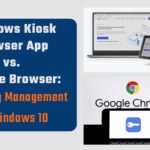Mobile devices are important. They also come with a responsibility, to ensure adherence to all regulations concerning them for safe keeping of data. This is the role Mobile Device Management (MDM) plays. It is similar to being a protector for your devices by guiding you on what you need to do to follow guidelines and maintain security.
In this blog, we plan to explore the significance of MDM in ensuring compliance. Additionally, we shall observe the way it secures data preventing stealth breaches while at the same time ensuring adherence to critical regulations. Therefore, let us delve deeper into the necessity of MDM in maintaining the course of your business!
What is Mobile Device Management (MDM)?
All you need to do is set up your Android devices so that they can only run a few apps. This will help keep the employees concentrated and prevent them from being diverted by non-office-related apps as well as sites. Moreover, it enhances security and boosts productivity in that only job-related apps would be available.
A company can face large fines for not obeying these laws. Due to the high number of mobile device users, a company must have regulations governing their use at work. This ensures the security of any information about the organization’s clients or even its employees on mobile devices.
For a company that issues employees with company phones (Corporate Device policy) or allows employees to use their devices at work (Bring Your Device or BYOD policy), MDM rules must be in place.
Mobile Device Management rules typically include ensuring proper registration of mobile phones, disallowing the download of particular software and having specific security policies. Employees should regularly be trained, and there should be a compliance team too to verify if anyone flouts the regulations.
Importance of MDM in Ensuring Compliance
Enhanced security
An MDM platform is used to ensure the safety of business data on company devices where rules can be set by IT to enforce strong passwords and lock devices when idle. Also, MDM tools ensure that only secure connections to the company server, such as VPNs or 2FA are made. This type of software encrypts communication between any pair of devices linked through email or internet use. Data from business applications on the device can also be encrypted to ensure security during transmission via the network.
Decreased downtime and deployment times
Mobile Device Management software allows monitoring of mobile devices by IT teams at all times so that their downtimes are minimized. It gathers device data from which IT can identify issues before they occur, which could lead to device failure.
Management of mobile devices is easier and faster for IT personnel with MDM. All the settings and apps can be sent to the device remotely rather than typing them in manually. As soon as the user starts the device, all necessary things are done automatically. After entering their details, users can immediately begin working with company materials.
Improved productivity
IT can use a central platform to deploy and remotely update apps on devices. Because of this, workers will always have access to necessary apps regardless of their location. Monitoring apps located on devices allows MDM tools to ensure that staff have all conditions for working. Thus, people will spend less time preparing for work which makes them more efficient.
Application control
The apps can be installed by IT teams onto devices without requiring employees to do it themselves. This can be done either through special means or via the app store. This ensures that there are working applications for the workers.
The lists of allowed and prohibited apps can be made using AI. This would prevent the installation of non-compliant or harmful apps in corporate devices besides removing outdated ones. Also, apps can be configured to automatically update or remove themselves. App usage tracking would enable IT to enforce compliance measures; as well as identify improvement areas in certain cases.
Optimized data collection
Data collection helps in identifying problems as well as the means through which they can be improved. Below are the classes of data that come from mobile devices:
- Basic details include the type of device, serial number, operating system and installed applications.
- Know where in the world the device is; this gives an idea of how it is being used.
- Information about password maintenance, invalid login attempts, and encryption being in place to protect the data stored can be obtained.
- Numbers on the frequency of app opening and data consumption.
- Details about data volume and Wi-Fi networks, to which the device is connected to.
- This allows us to know if a device has been tampered with or if it is not respecting the security rules we have set.
Risk management
Organizations must secure devices and their data by protecting them from cybercrimes like hacking. Using an MDM platform ensures that the latest version of the operating system is installed on the device and updated regularly. This reduces incidences of compatibility issues and security vulnerabilities.
Various ways exist by which the loss of data on a mobile device can be prevented. For instance, certain apps with important business-related information can be locked using passwords. Also, between work and personal email and apps, data cross-copying can be prevented with the aid of rules that IT puts in place.
How does MDM help with compliance?
The main area where the firm assists enterprises in complying with laws concerning mobile equipment is monitoring these widgets keenly. Thus, through MDM, administrators can configure safety options such as passwords and encryption. These measures ensure not only security but also compliance with specific standards. This system also helps in enabling organizations to monitor their usage while simultaneously instantaneously establishing possible illegal conduct.
In case the device is lost or stolen, MDM enables the administrators to remotely erase highly confidential and compliant data that cannot be shared without specific credentials which in turn helps to avoid unauthorized access and data breaches. Furthermore, MDM stores records and reports in an easily accessible and audit-ready form to enable enterprises to be compliant in the event of audits or investigations. In the end, MDM is a statutory requirement and organizations must observe statutes, prevent inadvertent information leaks and avoid contravening statutes.
Monitoring and Auditing Device Usage of MDM:
Mobile Device Management (MDM) platforms can provide insights into the way devices are being used, the applications that are installed on them, and any activities occurring on the network in real-time. As a result, it becomes possible for administrators to effectively oversee adherence to organizational regulations or legal stipulations. Observing behaviors exhibited by gadgets including data accessibility or app utilization enables these professionals to ascertain if workers are adhering to guidelines as per set procedures or not since they can ascertain the absence of any unauthorized activities.
Furthermore, MDM platforms have audit capabilities for generating comprehensive reports about the status of device compliance. These reports are useful in both internal assessments and regulatory audits since they provide compliance evidence and areas that can be improved.
Regulatory Compliance Standards
An organization needs to prioritize compliance with the provisions of numerous regulatory frameworks to ensure the safety of their data and privacy.
GDPR (General Data Protection Regulation)
Organizations that hold personal data of European Union citizens must comply with strict requirements laid out by GDPR. Companies implement data encryption and enforce privacy controls to comply with GDPR through MDM. They also facilitate data subject access requests as part of their GDPR compliance efforts via MDM. Through MDM it can be guaranteed that confidential personal information is treated according to the GDPR. This also helps to prevent any possible fines due to non-compliance with GDPR.
HIPAA (Health Insurance Portability and Accountability Act)
To protect patient health information, healthcare organizations should comply with HIPAA regulations to secure it and prevent unauthorized access, disclosure or alterations. MDM solutions help healthcare providers secure mobile devices that are used in accessing e-health records as well as communicating sensitive patient data. This is important because MDM assists in enforcing encryption, access controls and audit trails which guarantees HIPAA compliance while at the same time ensuring patient privacy remains a top priority.
CCPA (California Consumer Privacy Act)
The California Consumer Privacy Act (CCPA) gives Californians specific powers over how businesses in the state gather, use and distribute their data. Companies can then comply with the CCPA through methods like reduction of detail, increasing customer information inquiries or making data protection more robust so it works best for them all using MDM.
Minimizing data collection and strengthening data protection practices with MDM helps organizations avoid non-compliance risks from CCPA regulations. It also enhances the safeguarding of consumer privacy.
Conclusion
In conclusion, the importance of using MDM protocols in compliance with set regulations as well as protection of information on mobile devices. MDM addresses these issues by ensuring that security measures are strictly implemented.
Managing device usage and enabling organizations to have remote control, thus minimizing risks such as data leakage and fines for noncompliance. And it still serves as an effective method of protecting the security of mobile environments. This is crucial as regulations for mobile communications are actively developing in today’s environment.
To check out more such content, follow Intentdesk.





